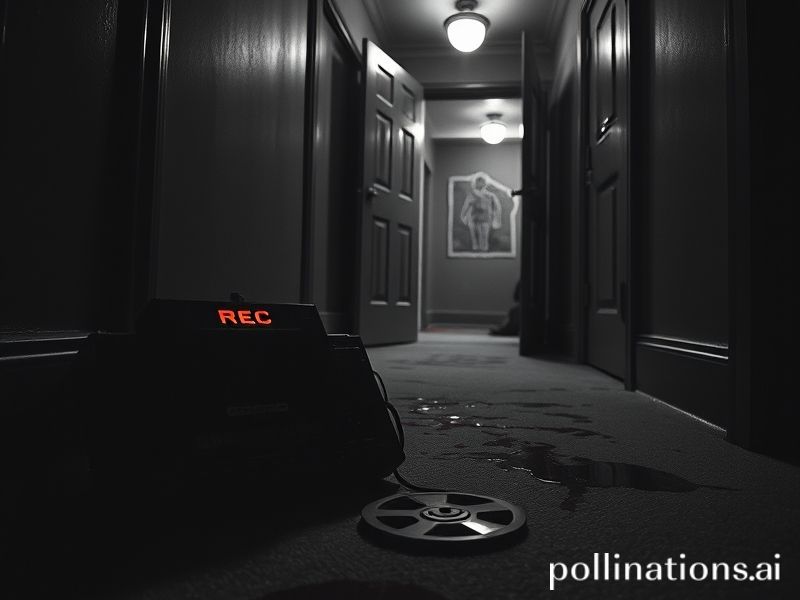Only Murders, Worldwide: How the Planet Turned Homicide into a 23-Billion-Dollar Comfort Blanket
Only Murders, Universal Mayhem
Dispatch from the Bureau of Obvious Calamities, International Desk
Dateline: Everywhere – The phrase “only murders” began life as the punch-line to a very American joke: a true-crime podcast so niche that homicide is the sole acceptable plot device. Cute, until the rest of the planet realized the gag had grown legs, bought noise-canceling headphones, and started treating extrajudicial death as the planet’s shared comfort blanket. From Lagos traffic jams to Oslo book clubs, citizens now self-soothe by bingeing on strangers’ tragic finales, proving that Schadenfreude is the last remaining export the industrialized world still manufactures at scale.
Consider the numbers. Spotify’s internal dashboards (leaked by a disgruntled Swede with ethical indigestion) show true-crime consumption up 540 % since 2018, comfortably outpacing both K-pop and mindfulness meditations—an irony not lost on a species that apparently needs calming whale sounds after listening to three hours of garroted pensioners. In Brazil, podcast hosts have monetized police scanner apps, auctioning off ad slots before the bodies reach the morgue. Meanwhile, Japanese commuters snack on limited-edition “Detective Cola” while streaming dramatized reenactments of the Aokigahara forest, because nothing pairs better with carbonated citrus than existential despair.
The geopolitical angle is equally grotesque. Countries with alarming actual murder rates—Honduras, South Africa, bits of the Balkans—find their tourism boards frantically tweeting #NotJustMurders, only to be drowned out by American retirees asking Airbnb hosts if the local cartel offers “authentic crime-scene reenactments, but with gluten-free catering.” Egypt, never one to miss a branding opportunity, is reportedly mulling a true-cruise down the Nile: solve the whodunit before the felucca reaches Luxor, get a free cartouche. The Ministry of Antiquities denies it, but their spokesperson was giggling too hard to finish the sentence.
Europe, ever the mature sibling, prefers its homicide artisanal. The Nordic noir industry single-handedly keeps Iceland solvent, as tourists tramp through lava fields searching for “that depressed cop with the lumpy sweater.” Denmark actually ran out of bleak weather; production assistants now haul in refrigerated fog machines so Netflix can maintain the correct atmospheric misery. Brussels, pivoting to soft power, proposes an EU-wide “Ethical True-Crime” label—fair-trade corpses, carbon-neutral serial killers—though enforcement is tricky when France keeps surrendering to its own subsidies.
The darker joke—yes, we can go darker—is that all this scripted murder is distracting us from the unscripted variety. Global assassinations of journalists hit a record high last year, but their stories rarely trend because they lack the requisite cliff-hanger structure and tasteful theme music. Sudanese protesters shot in the street can’t compete with a nicely mic’d 911 call from Phoenix. The algorithm, like any good psychopath, values engagement over empathy.
Still, the economic upside is undeniable. The World Bank quietly estimates the “murder leisure” sector—podcasts, streaming rights, merch, themed brunches—at USD 23 billion, or roughly Armenia’s GDP. The UN briefly floated a resolution condemning the commodification of human tragedy, but Russia vetoed it, claiming “some of us are just better at monetizing despair.” They would know.
So we arrive at the inevitable cultural cul-de-sac: a planet where homicide is both problem and product, where citizens of murder-capital nations relax by listening to slightly safer murders committed elsewhere. It’s the macabre version of outsourcing: keep the fear local, import the entertainment. And should you feel a twinge of guilt while sipping your “Blood-Spatter Cold Brew,” relax—guilt doesn’t trend. The algorithm has already queued up the next episode, complete with soothing ad copy for better mattress delivery. Sleep tight; statistically, it’s someone else’s turn tomorrow.







